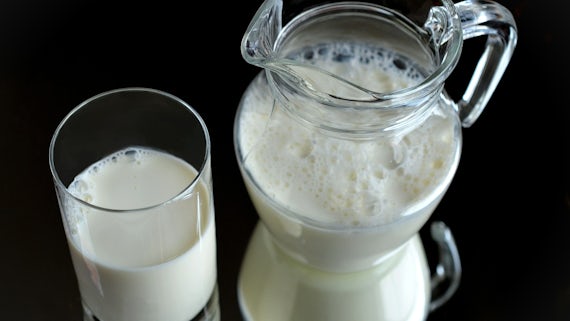Is choice of milk impacting your child’s IQ?
22 Mai 2017

Professor of Nutritional Medicine Margaret P Rayman, from the University of Surrey, delivers an insightful public lecture on the importance of iodine development in pregnant women at Cardiff University’s Hadyn Ellis Building.
As recent UK studies show notable iodine deficiency in pregnant women and women of childbearing age, ‘Nutrition and Brain Development’ examines how important this chemical really is – and what happens to the human body if we neglect this vital ingredient.
'Ensure you’re getting enough!'
Iodine is a chemical element essential for the production of thyroid hormones that regulate growth and metabolism. Diets deficient in iodine increase the risk high cholesterol, lethargy, fatigue, depression, weight gain, and problems with mental processing.
Accordingly to Prof Rayman, this deficit can also lead to disorders including goitre (a swelling of the thyroid gland in the neck), and stunted motor and brain development (cretinism) in children whose mother lacked this key component while pregnant.
“Iodine, which is the Greek word for ‘violet’, comes from the sea in various states,” Prof Rayman explained. “It is transferred from oceans to the atmosphere and is crucial to human development, growth and metabolism, which regulates cell activity. Despite universal salt iodine policies having been instituted in more than 120 countries, iodine deficiency is still worryingly common.
"Both too much and too little iodine in our diet can cause hypothyroidism (or ‘underactive thyroid’), which is a condition where the thyroid gland does not create enough of a thyroid hormone called thyroxine. This is because iodine’s role in the thyroid is to make hormones, thyroxine and triiodothyronine.”
Organic vs. full-fat milk
Recent UK studies show deficiency in women of childbearing age and those who are pregnant.
“This demographic requires a higher consumption of iodine because 50% more thyroid hormone is provided during pregnancy for the mother and the baby,” Prof Rayman explained. “During pregnancy, women also have to make up for loss of iodine through the kidneys.
“Milk and yogurt are the best sources of iodine from daily products. However, drinking organic milk is not always an ideal scenario.
“Cows eating white clover that is used to produce organic milk prevents the uptake of iodine. The quantity of iodine in milk varies according to farm practices, method of production and seasonal variation.

“Conventional milk is 74% higher in iodine. Soya milk also scores very low as 12.7 on the iodine concentration scale – compared against conventional milk which is a much healthier 438.
“If you drink 280ml of milk a day, you’ll almost be consuming enough! Some major UK retailers sell iodine fortified soya, oat and rice milk, but even that only takes the rating up to 280, 287 and 266 respectively.
“There is also evidence to suggest that goat’s cheese is better than cow’s cheese for iodine content, though more research is needed to determine why this might be.”
Iodine levels impact IQ
In 2016, the first map of pregnancy-related iodine data was created, revealing that non-pregnant women mostly possessed adequate levels. 14,547 pregnant women were then enrolled for an ALSPAC study in Bristol to examine iodine deficiency and whether or not it has an adverse impact on the brain.
Women were eligible for the study if they had been able to give a urine sample during their first trimester. Their children were then monitored for over 20 years.
“The study proved that the lower the mother’s – and subsequently the child’s – iodine intake, the worse the children scored for verbal IQ,” said Prof Rayan. “Results showed the women were mildly-to-moderately deficient as sufficient iodine uptake is hard to receive by managing diet alone.
“Women need to ensure their intake of iodine is high when considering getting pregnant (three months prior) as it can be dangerous to increase intake once two months into pregnancy.”
Food groups
Other ‘at risk’ groups include low milk/dairy-product consumers (teens/young women, people who worry about products being fattening), low fish consumers, and vegetarians.
But iodine deficiency doesn’t affect all sections of the UK.
“Children aged 8-10 years old show no evidence of deficiency as they are high consumers of full-fat milk,” said Prof Rayman.
“Seafood is a fantastic food group – haddock and cod are excellent sources for iodine and are not harmful fish for pregnant women. Oily fish is surprisingly low and shellfish is only slightly better. One piece of fish a week would be good while pregnant. Brown seaweed is dangerously high (2400) compared with laverbread which only has a reading of 0.7.
“The UK rates top three in the world for milk-iodine concentration. There is some discrepancy among countries on what the ideal intake of iodine during pregnancy should be. The UK authorities suggest mothers need just 140mg a day while the US, Australia and New Zealand argue that numbers should be more like 220–250mg.”
Anyone wanting to learn more food facts about iodine can read the factsheet here: https://www.bda.uk.com/foodfacts/Iodine.pdf
About Prof Margaret P Rayman
With a PhD in Inorganic Biochemistry from Somerville College, Oxford, Prof Rayman has held post-doctoral fellowships at the Institute of Cancer Research and Imperial College.

Since 2007, she has been Professor of Nutritional Medicine at the University of Surrey where, in 1998, she set up – and now directs – an MSc programme in Nutritional Medicine. In 2014, Prof Rayman was appointed Visiting Professor at the First Affiliated Hospital Xi’an Jiaotong University School of Medicine, Xi’an, China.
Her research, which includes a number of randomised controlled trials, centres on the importance of trace elements to human health with particular emphasis on selenium and iodine in populations.

